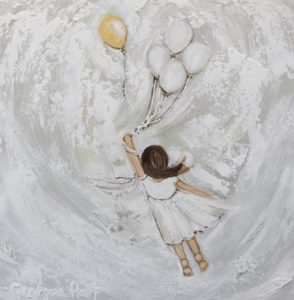Children are affected by the loss of a loved one, just as we adults are. Depending on their age and maturity, they will have different needs and show various symptoms. Siblings might respond in a similar manner or some seemingly not as much.
1. Support according to age and maturity
All children are affected, how and if they show it can be quite different. Young toddlers might not consciously know what’s going on, nor cognitively understand death, but they respond to the parents’ emotional state. Teenagers understand and often deal with death in their own personal way. Choose support for your child according to their personal needs, age and maturity.[Tweet “Why Everyone Wins When You Put Your Oxygen Mask on First”]
2. ‘Put your own mask on first’
As the announcement when taking off in a flight says: “Put your own mask on first and then help your child.” This applies to supporting your child through grief. Look after your own needs first, and then you will be better equipped to help them. This obviously means that you still feed the kids…
3. Books
Stories and metaphors are a great way to explain death and dying to your children. Choose an age appropriate book or go to the library and have your child pick one. The librarian might also know some suitable books to recommend.
4. Keep up the routine
As much as possible keep up the routine you have with your children. They need some stability, and ‘things that stay the same’ assist in the turmoil of life and death.
5. Be there fully, when you can
Finding the balance between looking after yourself and being there for your children might not be an easy one. Be there fully, when you can.
6. Ask for help
Involve your family and friends in looking after the children and teens when you need your personal space and time. Have someone (that you feel comfortable with) come and stay with you to help cook, clean and run errands.
7. Expect changes
I am not someone who easily flows with changes. The journey dealing with loss brings changes, personally as well as with children and teens. Expect them to be different and act in disparate ways. They might show changes in appetite, be less interested in schoolwork and become lethargic. Give them time.
8. Acting out
As mentioned before, children and teens may act differently and behave strangely. This is because sometimes they don’t know how to be with these emotions that they feel in their bodies. Be mindful and show them your love and understanding.
9. Show them love
A hug goes a long way in comforting not only children but adults as well. In fact, I have read research that shows that hugging, as well as crying, releases chemicals in the brain that help with the sadness.
10. Get professional help
Feel encouraged to ask someone you trust for advice or a referral. This might be a friend, who’s experienced loss, a social worker, priest, nurse, your child’s schoolteacher, psychologist or your doctor.
Healing takes time. Dealing with the changes that the loss brings and adjusting to the life without this person takes time and space. Allow for it.




Leave a Reply